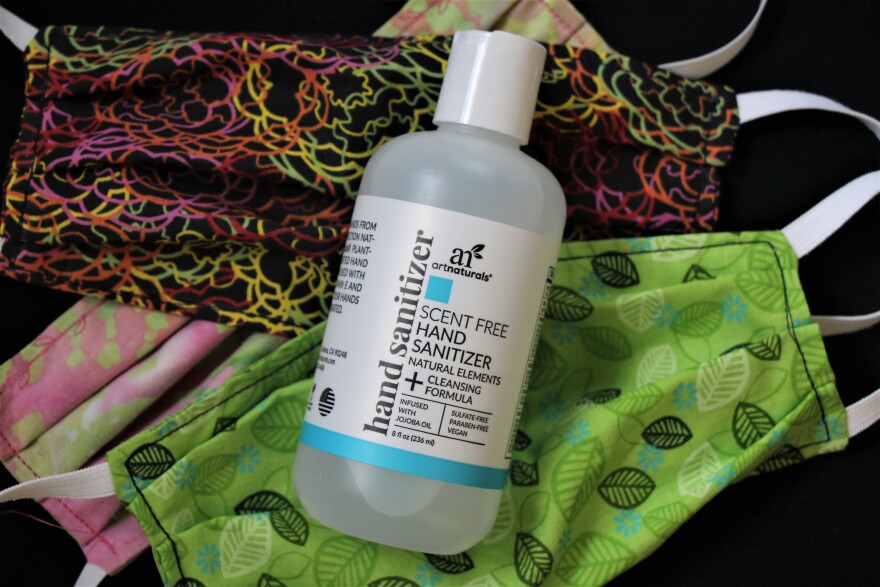The Kansas News Service is boiling down key coronavirus-related developments in the state. To read this information in Spanish, go here.
This list was last updated at 1:20 p.m. Jan. 8. CASES AND DEATHS
242,322 cases (see map for counties)
7,257 hospitalizations
3,148 deaths
NOTE: KNS will update these figures Monday, Wednesday and Friday. The tallies include both confirmed and probable cases ("confirmed" being people who test positive for the virus, while probable is people with COVID-19 symptoms and direct exposure to confirmed cases or people who have tested positive on antibody tests and have symptoms or direct exposure to confirmed cases). View additional charts showing the disease’s spread over time and other trends here.
TESTING AVAILABILITY
The rate of testing in Kansas started slow, but in June state health officials said capacity had improved and Kansas could now test at least 2% of its population per month.
Kansans who aren’t very sick or don't have any symptoms and don’t work certain essential jobs may still have trouble getting tested. Hospitals and clinics want more rapid testing platforms and kits.
Under a new federal law, you should not have to pay for your coronavirus test, regardless of insurance status (but patients could still see related bills).
HOW ARE UNIVERSITIES RESPONDING?
Public and private universities and community colleges in the state finished the spring semester online. Big schools will come back in the fall, but with dramatically different schedules. The University of Kansas is mandating face masks and plans to test every student, staff member and instructor. Haskell Indian Nations University will go online only.
HOW ABOUT K-12 SCHOOLS?
In mid-March, Kansas became the first state in the U.S. to shut down school buildings for the rest of the 2019-20 school year, moving all learning online.
As the 2020-21 school year approaches, the state Board of Education has issued guidelines for reopening. And while the governor wanted to push back the in-person state date statewide until after Labor Day, the Board of Education rejected that.
SHOULD I SELF-QUARANTINE?
The Kansas Department of Health and Environment (KDHE) is mandating home quarantine for 14 days if you've traveled to the places listed at this website (KDHE updated the list Aug. 11). If you come down with symptoms (such as a fever of 100.4 degrees or higher, coughing or shortness of breath) during those 14 days, contact your health care provider and explain your potential COVID-19 exposure.
People who need to continue to quarantine include those told by public health officials to do so because of known exposure to the virus.
Some doctors recommend patients with COVID-19 symptoms stay home even if they test negative for the disease, because some studies point to significant risk for false negatives.
DO I NEED TO WEAR A MASK?
Since July 3, anyone in Kansas is supposed to wear a mask in public places or in outdoor public situations where you cannot socially distance. But a majority of counties opted out of Kelly’s executive order.
The rule has a few exceptions:
- If you’re at a restaurant, you can take off your mask to eat, but still need to sit six feet away from other tables.
- Athletes in training don’t need masks, but the six-foot rule still applies.
- Adults with medical conditions, disabilities or mental health issues that make it hard to wear a mask don’t have to.
- Neither do kids who are 5 or younger.
HOW BAD IS THE VIRUS?
COVID-19 usually causes mild to moderate symptoms, like a fever or cough. Most people with mild symptoms recover in two weeks. More severe cases, which are more common in, but not limited to, older adults and people with health issues, can have up to six weeks’ recovery time or can lead to death.
HOW CAN YOU AVOID IT?
- Wash your hands for at least 20 seconds. Frequently.
- Cover your coughs.
- Wear a mask in situations where social distancing isn’t possible; instructions for sewn and non-sewn versions are here.
- If you’re an older Kansan or medically fragile, limit your trips to the grocery store or any public space.
- Stay home if you are sick — this goes for all ages.
FOR MORE INFORMATION ON COVID-19
Kansas Department of Health and Environment: http://www.kdheks.gov/coronavirus/
The Centers for Disease Control and Prevention: https://www.cdc.gov/coronavirus/2019-nCoV/index.html
Spanish translation by Simon Oliva, Marcela Renna, Leigh Rysko, and Cristina Seyler in partnership with America Amplified. If you have any questions or concerns about the translation, please email Jennifer@americaamplified.org.
The Kansas News Service is a collaboration of KCUR, Kansas Public Radio, KMUW and High Plains Public Radio focused on health, the social determinants of health and their connection to public policy. Kansas News Service stories and photos may be republished by news media at no cost with proper attribution and a link to ksnewsservice.org.

